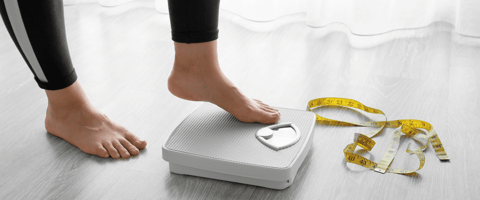Motivate Your Spouse To Get Healthy

You and your spouse used to bond over eating out & pigging out, watching TV, or partying (or all of the above), but you have decided to make some changes and start living healthier. You’ve started to exercise, or you’re cooking fresh meals, or you’re drinking less, and as a result you’re noticing improvements in your energy level, your mood, and possibly your physique. It would only be natural that you would want the same positive changes for your spouse, and yet she or he does not seem to be as motivated as you in making these health changes.
What should you do? If your initial action is to invite them to participate in the changes with you, or to proselytize about your new health lifestyle, you may be disappointed by the *crickets* coming from your spouse. I want to assure you that both your spouse’s and your reactions are normal and understandable.
Rather than feeling stuck, try these THREE TIPS for helping your spouse make healthy lifestyle changes:
1. Focus on Feelings, Not Physique
If your healthy lifestyle journey has yielded physique changes such as weight loss or improved muscle tone, you likely feel happy about that. However, for someone who is trying to make healthy living a HABIT rather than a quick-fix, physique goals are the LEAST likely motivator for making and maintaining healthy habit changes.
An approach to health habits that is more effective and more likely to produce long-term results is focusing on how the healthy changes impact all the other areas of your life, aside from the physique changes. You might notice such effects as:
- More motivated or focused at work
- More optimistic
- Increased energy and stamina
- Improved relationships with family and friends
- Improvements in sleep
- Enjoyment of exercise
- Enjoyment of “healthy” foods
- Better sex life
When you talk about the intrinsic rewards of living healthier, you both reinforce your healthy lifestyle for yourself, and also make it more appealing for your spouse to want to make similar changes. Physique goals can be daunting, but intrinsic goals, such as improved sleep, relationships, and happiness–can be very compelling.
2. Cultivate Healthy Boundaries
Boundaries are what distinguish one person from another. Boundaries can be physical, such as space separation, or emotional, such as allowing recognizing that you and your spouse have distinct ways of thinking and feeling.
Healthy boundaries means you allow your spouse to have their own likes and dislikes, preferences and aversions, joys and challenges. The ways you have become successful with your healthy habit changes will not necessarily work for your spouse. They get to find their own path to health, and healthy boundaries will allow you to allow them to journey at their own pace, in their own direction, and in their own way.
Similarly, if you are feeling pressured from your spouse to stop or modify some of your healthy habits, look within yourself to evaluate whether their perspective is valid (ex: are you really “over-doing it”?), or if perhaps they are being overly-sensitive. Healthy boundaries will compel you to “just do you”, while simultaneously loving and respecting your spouse. The more you hold on to your sense of self–your strengths, progress, and perspectives–in kindhearted ways, the more you give your spouse permission to do the same.
No two healthy lifestyle journeys are alike. What resonates for some may feel too restrictive to others. We have unique preferences and limitations that affect how our healthy lifestyle will take shape. Allowing for and celebrating these differences in your approach vs. your spouse’s, can help both of you maintain health habits long-term.
3. Meet Them Where They Are
There is a concept in psychology called “Stages of Readiness for Change“. The idea is that we cycle through various psychological “stages” before we are actually ready to change. Depending on the change, we may cycle faster or slower through the following FIVE STAGES:
1) NOT READY TO CHANGE: In this stage, your spouse will likely not talk at all about wanting have a healthier lifestyle because it will not even be on their radar.
2) THINKING OF CHANGING: Your spouse is thinking about making healthier changes, noticing others who are doing so, but will likely not talk about any intention or desire to change.
3) UNDECIDED / UNCERTAIN: Your spouse may start to speak about wanting to make healthy changes, but will be tentative about it, and will likely make excuses for not changing.
“Yea I know I really should get off this couch and exercise, but I’m so out of shape I’ll hurt myself.”
“I need to start eating healthier, but I just don’t have time to shop and cook healthy meals.”
4) SOMEWHAT READY: In this stage, your spouse has stopped offering excuses, and is now using words that indicate tentative intention, such as “might”, and “maybe”.
“My friend invited me to join her gym. I might do that–we’ll see.”
“I was thinking about cutting back on all the junk food I eat.”
5) VERY READY TO CHANGE: This stage is marked by confident, demonstrative language, such as “I’m going to…”, and “I will…”
“I decided that I’m going to go ahead and train for that 5K race my friends are doing.”
“Tomorrow I will go to the Farmer’s Market to get some produce.”
HOW IS THIS HELPFUL?
Knowing the Stages of Readiness for Change can help put into context where your spouse may be in her or his health journey. This can help you have more compassion for where they are, and less anxiety about their need to change NOW. They are somewhere on this path, and while they will journey at their own pace, there are things you can do to help them move through the Stages of Readiness for Change:
1) Empathize, Don’t Criticize.
If healthy habit change were easy, your spouse would already be doing it. As you’ve probably experienced, there are many obstacles to starting and maintaining a healthier lifestyle. There are time and financial restraints, lack of motivation, self-doubt, physical limitations, stress and exhaustion…and the list of challenges goes on.
You will do more to help your spouse on their health journey by showing you understand their challenges, then by criticizing them. (This is a helpful tip for all couple problems, by the way–empathy is a much stronger motivator than criticism!)
Once your spouse feels validated, they feel more empowered to make their life better.
2) The Way You Can “Fix” is Through Reflective Listening.
Men (and women!) tend to want to “fix” the problems their spouse presents them with. So here’s a way you can instantly make things better when your spouse expresses struggle with healthy changes: Listen Reflectively.
Simply put, Reflective Listening is summarizing and re-stating, in your own words, what you just heard your spouse say.
“It sounds like you’re really overwhelmed with work.”
“You’re frustrated with your weight.”
The secret behind Reflective Listening is that, humans are more competent than we often give them credit for when it comes to solving their problems. Your spouse needs support, not answers.
When your spouse feels truly heard, they will feel more supported to make the often difficult steps toward creating a healthier life.
Your spouse likely knows WHAT to do to get healthier, and doesn’t need you to remind them how they’re not living up to that ideal. What they really need is an engaged listener to support them in navigating the challenges of their health journey.
FINAL THOUGHT
Research shows that health habits are “contagious”. People who associate with, or are married to, other healthy people, are more likely to become healthy themselves. Feel proud of the positive changes you’ve made in your life, and trust that, through your loving support, your spouse will find their own path to health. Learn more tips on strengthening your marriage with this blog post!










LEAVE A COMMENT